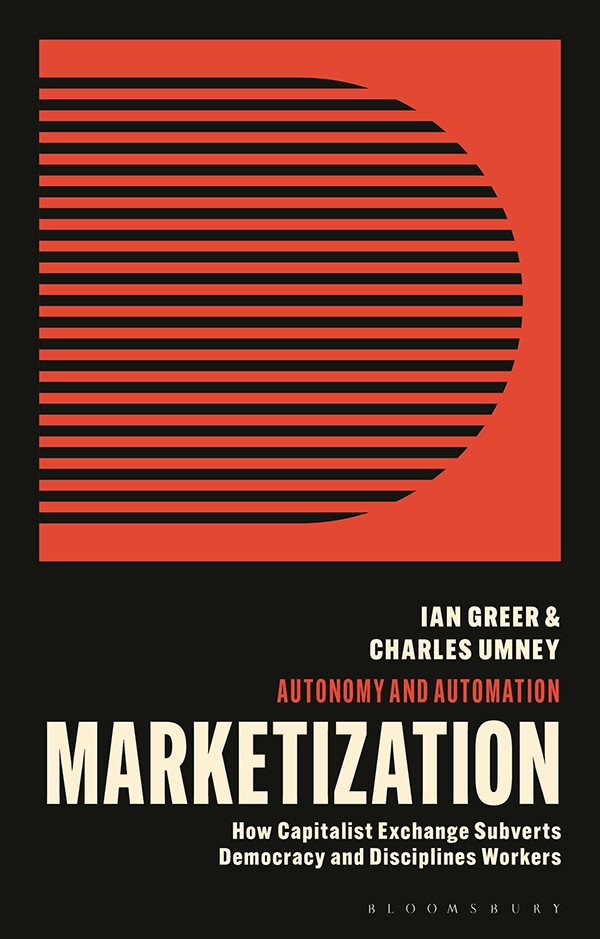Marketization in Europe worsens worker conditions
By Mary Catt
Competition among workers creates conflict, according to a new book co-authored by Research Professor Ian Greer, M.S. ’03, Ph.D. ’05 that explores how European markets function, who creates, shapes and organizes them, and what they mean for the relationship between labor and capital.
“Marketization: How Capitalist Exchange Disciplines Workers and Subverts Democracy,” published Nov. 3 and authored with Charles Umney, draws on dozens of conversations with policymakers, administrators, businesses, workers and trade unionists across Europe to examine how markets are created and manipulated by companies, policymakers and bureaucrats, and why intensified competition can lead to greater inequality.
Published by Bloomsbury Academic, the book summarizes studies carried out over nearly 20 years with colleagues in England, Belgium, Finland, France, Germany, Greece and Slovenia.
Welfare-to-work systems, health care and live music were examined by Greer, director of ILR’s Ithaca Co-Lab, and Umney to track the impact of marketization. Greer discussed their work in an interview with the ILR School.
Question: What set the stage for welfare-to-work systems, health care and other components of the European economy to be so deeply impacted by marketization?
Answer: In Europe, there has been a widespread view that the problems that plague labor markets and health systems can be solved through more competition. This view comes from long-held liberal doctrines behind the European Union’s single market with free movement of goods, services, capital, and labor. This kind of competition has been baked into the constitution since the 1950s. But the idea of making people compete domestically, within countries, mainly comes from more recent neoliberal thinking pushed by think tanks and embraced by political parties across the spectrum since the 1990s. The idea has also been adopted by corporations, for example, that create virtual marketplaces using apps, online platforms and algorithms.
Q: You found new ways in which workers were put in competition with one another to ostensibly reduce costs and improve quality. What were the consequences?
A: The main consequence is what we call class discipline. Workers have to compete with one another, and the result is that it becomes more difficult to negotiate for better wages and working conditions. In live music, for example, we identified some gigs in London, mainly corporate functions and weddings, that were increasingly found using online platforms. Unlike traditional entertainment agents, who in the past had “upsold” acts, platforms made it more difficult to negotiate higher fees for musicians by making price comparisons easier for their clients. Similarly, in health care, we saw examples of working conditions deteriorating because of competitive pressures and privatization. In health, this has not normally led to improvements in cost and quality, but it has contributed to staff shortages and bureaucratic bloat.
Q: You identified how people fight marketization in their everyday work. What does that look like?
A: The easiest-to-spot examples are large demonstrations where workers mobilize against the privatization or closure of services and sometimes also demand regulatory changes that reduce the competitive pressures they face. But we also witnessed lower-profile forms of resistance: musicians who refuse to work on the platforms, social workers who take their time identifying the needs of their clients, public-sector bureaucrats who don’t believe in privatization and listen to evidence that it doesn’t work, and community-based nonprofits that lose money, rather than becoming slick and corporate.
Q: What do you say to Americans who think this would never happen in the U.S.?
A: Sometimes I laugh, because I know that they are joking. Many Europeans think of the U.S. as a neoliberal model, with our private health system and our work-for-benefit schemes that replaced what was once called welfare. And the offshoring of jobs to countries with lower wages has put competitive pressure on American manufacturing workers for some decades now. But, behind this question is a serious point that in the U.S., so much of politics is driven by abuses of private power by billionaires and large corporations, backed up by the police, prisons and military. Many on the center-left believe that the solution is to break up these combinations and force capitalists to compete among one another. This is a fine idea in some ways, but it tends to ignore the workers involved.
Mary Catt is director of communications for the ILR School.
Media Contact
Get Cornell news delivered right to your inbox.
Subscribe

